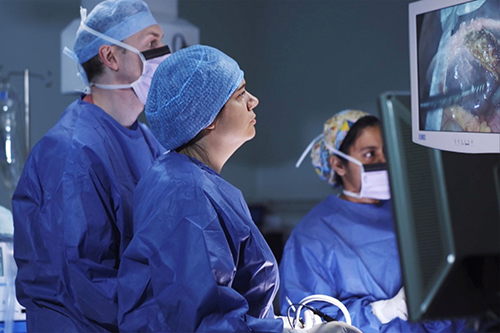New research has found no evidence of a difference between recovery time and complications when comparing standard and keyhole surgical incisions for the treatment of oesophageal cancer (cancer of the gullet). The study, led by the University of Bristol Medical School and published in the British Journal of Surgery, showed surgeons treating patients with oesophageal cancer do not need to change their practice if they have a strong preference for either procedure type.
Oesophageal cancer is the tenth most common cancer globally. It causes one in 18 cancer-related deaths. If only the oesophagus and local lymph nodes are affected surgeons usually perform a procedure called an oesophagectomy. This means they remove the oesophagus to try and cure the cancer. The two most common ways of doing this use either standard incisions (two large cuts) or ‘keyhole’ incisions (one large cut and several small ones).
The ROMIO study was funded by the National Institute for Health and Care Research (NIHR). It involved patients being randomly assigned to two groups. One of the groups had standard surgery (263 people) and the other had keyhole surgery (264 people).
Researchers found no differences between the groups in relation to:
recovery three months after surgery, as measured by patient completed questionnaires about physical function
how often patients developed complications and how severe the complications were
the extent to which the cancer was removed (it was equally well removed in both groups)
Chris Metcalfe, Professor of Medical Statistics at Bristol Medical School: Population Health Sciences (PHS), said: “Our study didn’t confirm findings from previous trials, which suggested that minimally invasive approaches to oesophagectomy reduced the number of complications patients would develop.
“We found no evidence of differences between standard and keyhole approaches in relation to short-term clinical outcomes or patient reported recovery of physical function over three months. There was no strong evidence that the costs of NHS resources in the first three months differed between the two approaches to the procedure.
“We will report about the longer-term recovery (24-month follow-up) and health of ROMIO participants in a separate publication. We will also publish the findings from a nested study on totally keyhole surgery.”
Jane Blazeby, Professor of Surgery in the Bristol Medical School: PHS, added: “These results show us that recovery after this type of major surgery is not influenced by the type of incision used by surgeons, despite prior beliefs that the keyhole approach is better than standard incisions.
“Future research is now needed to carefully evaluate robotic surgical techniques for oesophageal cancer surgery.”
Paper
‘Laparoscopic versus open abdominal surgery and thoracotomy for patients with oesophageal cancer: The ROMIO pragmatic parallel group randomised controlled trial‘ by The ROMIO Study Group in the British Journal of Surgery [open access]
Further information
About the National Institute for Health and Care Research
The mission of the National Institute for Health and Care Research (NIHR) is to improve the health and wealth of the nation through research. We do this by:
Funding high quality, timely research that benefits the NHS, public health and social care;
Investing in world-class expertise, facilities and a skilled delivery workforce to translate discoveries into improved treatments and services;
Partnering with patients, service users, carers and communities, improving the relevance, quality and impact of our research;
Attracting, training and supporting the best researchers to tackle complex health and social care challenges;
Collaborating with other public funders, charities and industry to help shape a cohesive and globally competitive research system;
Funding applcied global health research and training to meet the needs of the poorest people in low and middle income countries.
NIHR is funded by the Department of Health and Social Care. Its work in low and middle income countries is principally funded through UK Aid from the UK government.
About NIHR Bristol Biomedical Research Centre
NIHR Bristol Biomedical Research Centre’s (NIHR Bristol BRC) innovative biomedical research takes science from the laboratory bench or computer and develops it into new drugs, treatments or health advice. Its world-leading scientists work on many aspects of health, from the role played by individual genes and proteins to analysing large collections of data on hundreds of thousands of people. Bristol BRC is unique among the NIHR’s 20 BRCs across England, thanks to its expertise in ground-breaking population health research.

